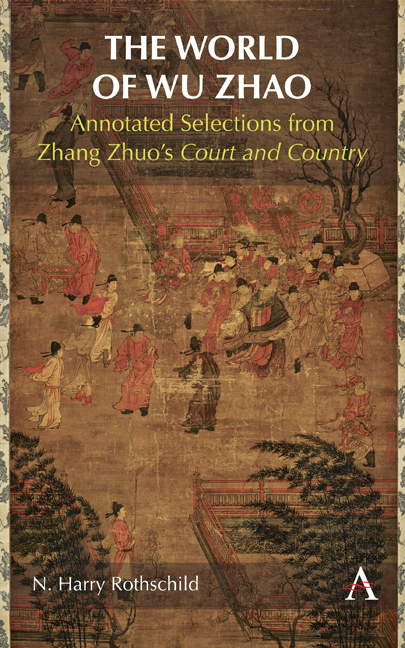Book contents
- Frontmatter
- Dedication
- Contents
- Acknowledgments
- Figures
- Map
- Tables
- Weights and Measures
- Introduction
- Chapter 1 Wu Zhao: her inner palace, her inner circle
- Chapter 2 The culture of the court
- Chapter 3 “Cruel officials”: Wu Zhao’s “teeth and horns”
- Chapter 4 Beyond court and capital: local officials
- Chapter 5 The common people
- Chapter 6 Relationships: men, women, and family in the time of Wu Zhao
- Chapter 7 Generals and military men
- Chapter 8 The frontier and beyond: foreigners and others during Wu Zhao’s reign
- Chapter 9 Religion and the supernatural world
- Chapter 10 Flora, fauna, and the natural world
- Afternote
- Appendix: People and Places
- Notes
- Bibliography
- Index
Afternote
Published online by Cambridge University Press: 15 November 2023
- Frontmatter
- Dedication
- Contents
- Acknowledgments
- Figures
- Map
- Tables
- Weights and Measures
- Introduction
- Chapter 1 Wu Zhao: her inner palace, her inner circle
- Chapter 2 The culture of the court
- Chapter 3 “Cruel officials”: Wu Zhao’s “teeth and horns”
- Chapter 4 Beyond court and capital: local officials
- Chapter 5 The common people
- Chapter 6 Relationships: men, women, and family in the time of Wu Zhao
- Chapter 7 Generals and military men
- Chapter 8 The frontier and beyond: foreigners and others during Wu Zhao’s reign
- Chapter 9 Religion and the supernatural world
- Chapter 10 Flora, fauna, and the natural world
- Afternote
- Appendix: People and Places
- Notes
- Bibliography
- Index
Summary
COURT AND COUNTRY—COMPRISED OF STORIES AND anecdotes that Zhang Zhuo saw, heard, and collected over the tortuous course of his half-century career—is usually classified as “brush notes” (biji 筆記) or “small stories” (xiaoshuo 小說). Zhang’s work includes a number of “accounts of anomalies” (zhiguai 志怪) and “miscellaneous records” (zalu 雜錄). Antonino Forte remarks that such “tales of little importance” (as he renders xiaoshuo) were “somewhat looked down upon by professional historians” who considered them “irrelevant or unworthy of inclusion in an official history.” Of Court and Country, Song chronicler Hong Mai offers the following contemptuous assessment: “All of the events that he has recorded are scattered fragments and trifling remnants. Moreover, in most cases he has taken creative liberties.” Furthermore, as the Introduction has shown, Zhang’s text is problematic and manifestly corrupt. So what, then, is the value of these translations, these shards of thought, these bits and pieces of a mercurial chronicler’s peculiar collection of fragments and anecdotes?
First off, these translations are made of bits and pieces of information that Zhang Zhuo gleaned and gathered. They are accounts of events that a man living in late seventh and early eighth century China heard or personally witnessed. Standard histories of the Tang dynasty (the two Tang histories and the Comprehensive Mirror) are all written after a lapse of two or three centuries following Wu Zhao’s death; Court and Country features vignettes compiled by a widely traveled and opinionated man who served in her court and was acquainted with a large cast of characters inhabiting her era.
Second, Court and Country amplifies not only our understanding of social and cultural history, but our grasp of the routine machinations of the court and bureaucracy. Anecdotes and “small stories,” as Xiaofei Tian frames them, “disrupt the flow of the grand historical narrative and expose the real workaday lives ‘behind’ such narratives.” Ellen Cong Zhang contends that unofficial sources of miscellaneous notes—works akin to Zhang Zhuo’s—from the Song dynasty have “proven invaluable to our understanding of many aspects of Song political, social, and cultural history.”
- Type
- Chapter
- Information
- The World of Wu ZhaoAnnotated Selections from Zhang Zhuo's <i>Court and Country</i>, pp. 223 - 226Publisher: Anthem PressPrint publication year: 2023

